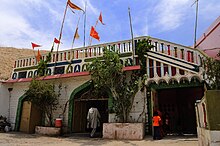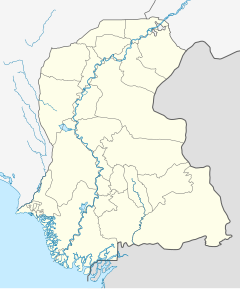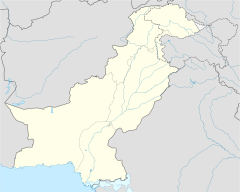Kalka Cave Temple
27°37′33.8″N 68°55′51.3″E / 27.626056°N 68.930917°E
| Kalka Cave Temple | |
|---|---|
 View of Kalka Cave Temple | |
| Religion | |
| Affiliation | Hinduism |
| District | Sukkur District |
| Deity | Kali |
| Festivals | Navaratri |
| Location | |
| Location | Aror |
| State | Sindh |
| Country | |
| Geographic coordinates | 27°37′33.8″N 68°55′51.3″E / 27.626056°N 68.930917°E |
| Architecture | |
| Type | Hindu Temple |
The Kalka Devi Temple, Kalka Devi Cave Temple or Kalka Devi Mandir is one of the holiest Hindu temples in Pakistan. It is situated inside a natural cave[1] in the Kalka hills in Aror, Sindh province, Pakistan.[2][3] The temple is known as the Asthan of Kalka Devi. It is visited by both Hindus and Muslims.[4] Hindus from India also visit.[5] The majority of devotees visiting the temple are Muslims.[6]
Significance
This is one of the historic Hindu temples in Pakistan.[7] According to the legend, Goddess Kalka Devi appeared on this place on her way to the Hinglaj Mata temple. According to the caretaker of the temple, there are two tunnels in the Kalka Cave temple which connect to the Hinglaj Mata temple.[8]
The temple is dedicated to the Goddess Kali. The word Kalka means power in Shashthi language. Devotees visit the temple on evening of the first Monday of every month. [9]
See also
- Ramapir Temple Tando Allahyar
- Hinglaj Mata mandir
- Shree Ratneshwar Mahadev Temple, Karachi
- Shri Krishna Mandir, Rawalpindi
- Krishna Temple, Sadiqabad
- Darya Lal Mandir
References
- ^ Farooq Soomro (23 December 2014). "Where the city of Aror once stood in glory". Dawn. Retrieved 13 July 2020.
- ^ Farooq Soomro (23 December 2014). "Where the city of Aror once stood in glory". Dawn. Retrieved 13 July 2020.
- ^ Rumana Husain (29 May 2016). "Kot Diji, Arore and a bit of Sukkur". The News. Retrieved 13 July 2020.
- ^ Salman Ali (19 November 2017). "Temple reflections — Asthan of Kalka Devi". Daily Times. Retrieved 13 July 2020.
- ^ "SUKKUR: Indian pilgrims worship at Sadh Belo, Arore Temple". Dawn. 7 December 2006. Retrieved 13 July 2020.
- ^ Essa malik, Munira Abbas (23 January 2015). "Discovering Sindh". Retrieved 13 July 2020.
- ^ Budhaditya Bhattach (28 July 2014). "Monumental effort". The Hindu. Retrieved 13 July 2020.
- ^ Farooq Soomro (23 December 2014). "Where the city of Aror once stood in glory". Dawn. Retrieved 13 July 2020.
- ^ Salman Ali (19 November 2017). "Temple reflections — Asthan of Kalka Devi". Daily Times. Retrieved 13 July 2020.



